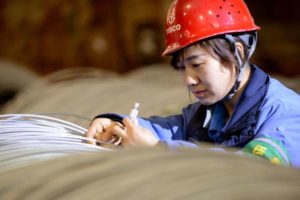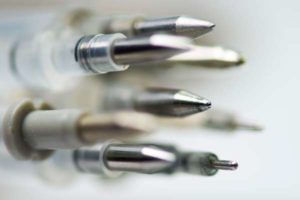By Yang Ziman in Beijing and Sun Ruisheng in Taiyuan | China Daily |
Updated: 2017-01-18 09:36
Shanxi-based Taiyuan Iron & Steel Co., Ltd, or Tisco, one of China’s major stainless steel producers, has independently developed the special steel needed to make the feedstock for ballpoint pens tips. It is hoped this will replace the annual import of 1,000 metric tons of special steel for making the pen tips.
“The feedstock, as small as it is (only 2.3 millimeters thick), requires an exact proportion of microelements,” said Wang Huimian, senior engineer of Taiyuan Iron and Steel.
With 26 years’ experience of working in technological development teams, Wang said that the ballpoint penfeedstock is a tough nut to crack.
“The steel requires the exactly right proportion of a number of special microelements to maximize the pen’s performance. Even a small difference in the proportions of the elements would affect the final quality. If the right proportions could not be found, China would always have to rely on imports,” said Wang.
The tip of a ballpoint pen is made up of two parts: the tungsten carbide ball for writing and the feedstock for holding the ball. China produces and exports the tungsten carbide ball. But the feedstock relies on imports from countries such as Switzerland and Japan.
China’s overall iron and steel output is in excess. Yet most of the overcapacity is in ordinary and low quality products. The country still has to import a lot of technology-intensive special steel.
The country makes 38 billion ballpoint pens every year, the biggest in the world. But it has to import more than 1,000 tons of steel for pen tips for 120,000 yuan ($17,386) per ton.
Taiyuan Iron &Steel’s project for developing homegrown feedstock started five years ago in collaboration with Beifa Group, one of China’s largest makers of ballpoint pens based in Ningbo, Zhejiang province.
Li Jianmin, technological director of Taiyuan Iron & Steel, said that additives in the steel affect the ability of the final product to resist corrosion. The quality of the feedstock is controlled by strictly managing the additives at every stage, including rolling, wire-drawing and heat treatment.
“The proportion of microelements that overseas companies use is usually a top secret. Taiyuan Iron & Steel has deciphered the proportion independently through thousands of experiments,” said Li.
The developers drew inspiration from making dough.
“If you want dough to be of just the right softness, you need additives. It’s the same with steel. The ordinary additives are in the shape of lumps. If they can be made fine and smooth, the liquid steel and the additives will be more evenly blended,” said Wang.
The technological breakthrough has pushed up the stock price of the Shanxi Taigang Stainless Steel Co Ltd, the group’s subsidiary listed on the Shenzhen Stock Exchange. From Jan 9 to 11, its stock price rose by 27.4percent to 5.12 yuan.



